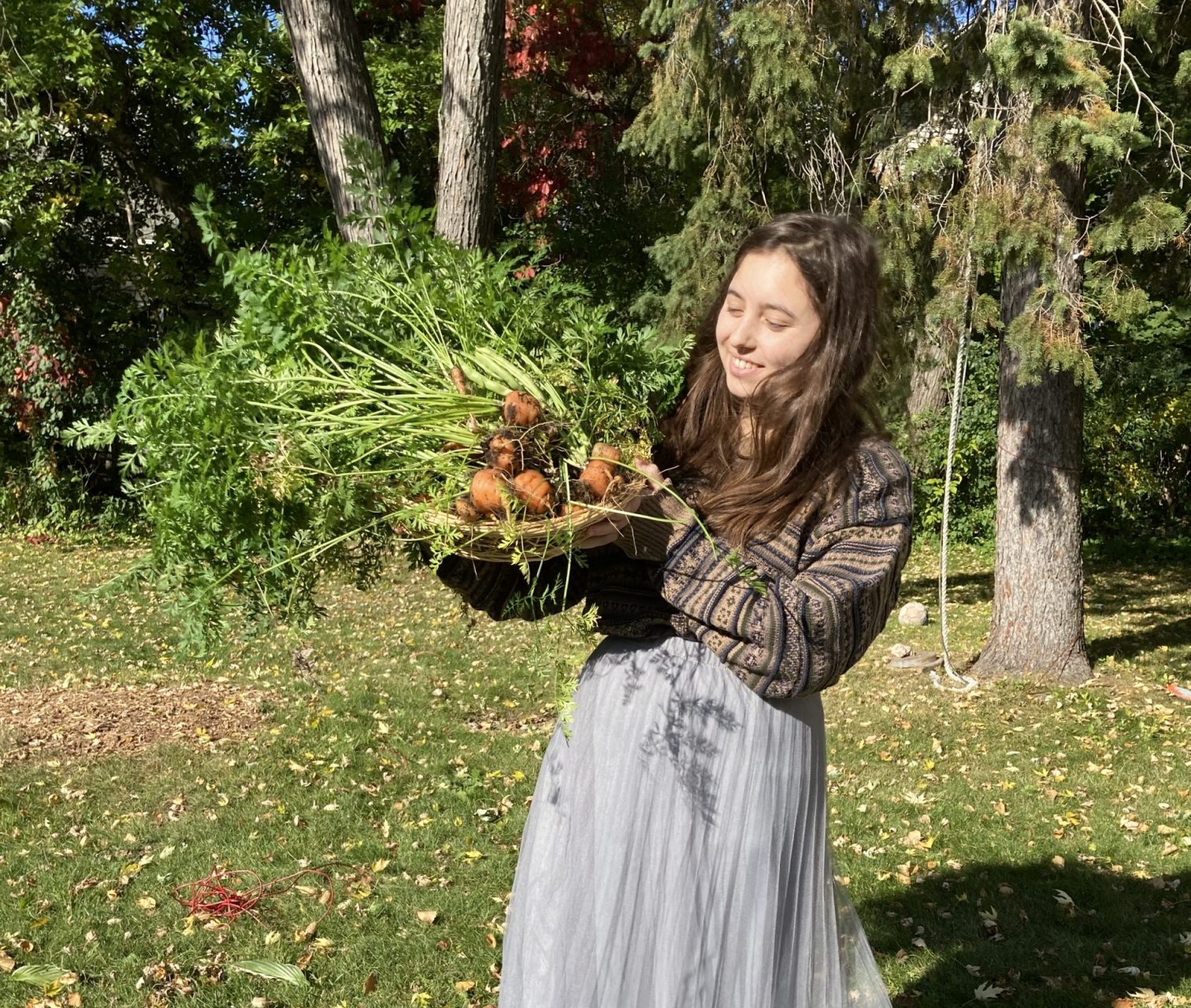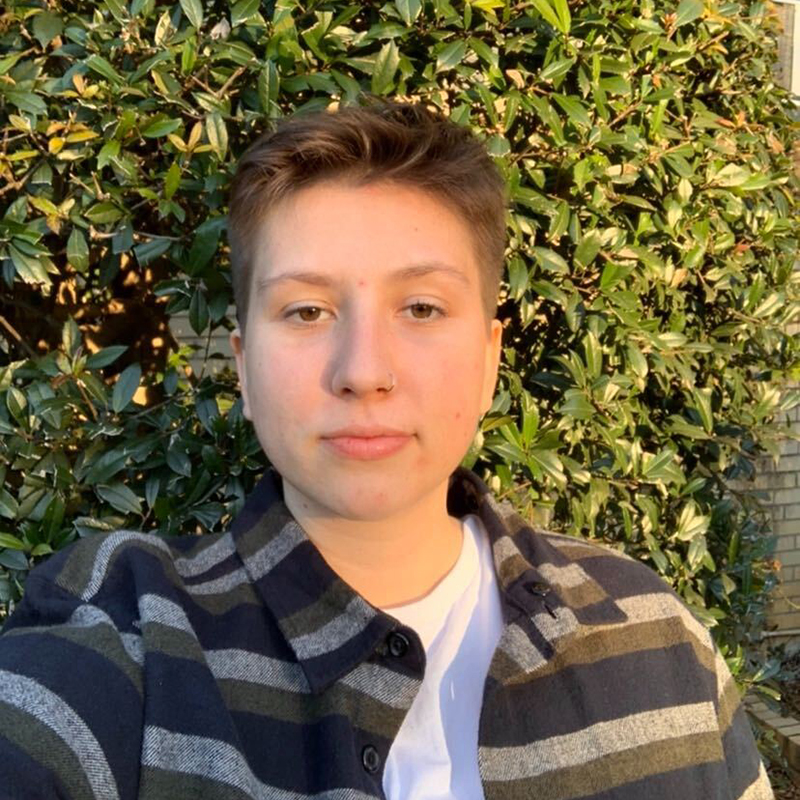Izzy Laderman: Climate Justice IS Disability Justice
Indi Howeth
|May 28, 2021

Izzy Laderman (she/her) is an 18-year-old disabled climate activist, survivor advocate, and sex educator based in Duluth, MN. She is the founder of Disability Awareness Around the Climate and works with various different climate groups. Izzy plans to attend the University of Minnesota to study History and aspires to become a History teacher, acknowledging the empowerment that comes with learning our own history. She also serves as a Youth Advisor for a local organization called Program for Aid of Victims of Sexual Assault.
Indi Howeth (IH): How did you get involved in climate activism?
Izzy Laderman (IL): I originally got involved in climate activism through Duluth for Clean Water, which was a group working on preventing the Polymet mine from going through. I then became the organizer for a local strike in my city on September 20th and from there it got bigger and bigger.
IH: When did you first realize the intersection between climate justice and disability justice?
IL: I first realized the intersection between climate justice and disability justice after I got my diagnosis of Ehlers Danlos syndrome and started identifying as disabled. At this point, I had worked in climate spaces and knew marginalized communities were disproportionately hurt by the climate crisis, but had never heard about disabled people, so I looked it up. That was my first time learning about it. The first time I experienced it was when I had to get to the hospital and there had just been a blizzard (increased in amount and severity by the climate crisis). We barely got there. That was when I realized that it wasn’t a far away thing, it was in my life and my area too.
IH: Do you think major climate organizations do a good job of adequately discussing disability rights as they relate to climate change? Why or why not?
IL: It depends on the organization. I feel a lot of organizations are doing better then they did before due to increased awareness, but they could also do so much better. Disability justice is integral to climate justice.
IH: Why did you decide to start Disability Awareness Around the Climate Crisis?
IL: I started DAACC because I was constantly fighting for disabled people to be included when I was working with the US Climate Strike, with barely any progress. I know having an official sounding organization name to back you up when you’re fighting for accessibility can make it easier for you. I wanted other people to have that so they didn’t have to go through what I did. DAACC then evolved into an information and educational hub, which is also awesome.
Disability justice is integral to climate justice. One without the other isn’t true justice.
IH: What is the kind of impact you hope Disability Awareness Around the Climate Crisis (DAACC) has?
IL: I believe in the power of community. You can’t always rely on policy or the government to help you, marginalized communities know that, but your neighbors, your family, your friends — they can be there. I hope DAACC has the impact of making people aware, and prompt them to check on their friends, family and neighbors and say, “Hey, I learned this — can I help? Can we make a disaster plan? How can I support you?”
IH: What are some of the ways you think the climate movement fails to adequately address and advocate for disability rights?
IL: The biggest problem is simply not addressing it at all. There are lists of people affected by the climate crisis and disabled people are not on it. Disabled people need to be included, but beyond that, they need to be leaders. Accessibility is never a negative, it’s always a positive — not just for disabled people.
IH: What is eco-ableism and how can we combat it?
IL: Eco-ableism is ableism related to environmentalism and the climate movement. A big example of this is the plastic straw movement. A lot of people got the idea that plastic straws are contributing to the climate crisis the most, and need to be banned. However, a lot of disabled people rely on straws to eat and drink, and alternatives aren’t always accessible. We shouldn’t shame people for their needs.
IH: What are some ways that climate activists could make their activism more accessible to all people?
IL: I said it before many times and I’ll say it again: include and listen to disabled people. Every disabled person is different, and has different needs. No one knows what disabled people need more than disabled people. Listen to us. There’s so many things you can do: wheelchair accessibility, placing bathrooms nearby, providing captions and/or having an ASL interpreter present, and so on.
IH: Who are some of your fellow disabled activist heroes and where can we learn more about them?
IL: Daphne Frías is one of the first disabled climate activists I really knew about. Then through my organizing, I met other people, including Eleanor Dolan, Jade Tyra, Doran Walters, Alexia Leclercq, and so many more people.
IH: What is your advice to other youth, particularly who are disabled, who are interested in getting involved in climate activism? What do you wish you knew before getting involved?
IL: My advice is know what you need and find people to support you when you fight it. People don’t like to be told they’re being ableist or something isn’t accessible, so you have to be ready to fight for that. I also suggest knowing disabled history and how disabled people are affected by the climate crisis, this knowledge can help you when organizing. DAACC was founded to be an information and support hub. If you need help within your work and movement, we got you. I wish I knew early on what I know now about disabled history and justice. It would have helped a lot.
IH: What is your hope for the future of activism surrounding the intersection between climate justice and disability justice? What policy do you hope is put in place ASAP?
IL: I think emergency preparedness policy needs to be put in place ASAP, for all people, but with priority on disabled people. Disasters are getting worse and worse and we need to be ready. Disabled people are already dying, and we can prevent that.
My hope for the future of activism? I can’t really think of a specific thing, but hearing what people have to say at the end of trainings when I ask, “what are you going to take back to your own activism?” gives me hope. They tell me specific things they can implement in their lives, and it makes me happy.
IH: Thank you so much for participating in this interview!
All photos courtesy of Izzy Laderman and ACE
Answers may have been edited for length
Want to read more? Check out the ACE Blog.
Join our Youth Action Network
More Blog Posts

Unnatural, Not Unprecedented
For two weeks, residents of Southern California endured a waking nightmare. Parents raced against time – hurrying down the driveway …
Read MoreCrafting a Vision for the Future: My Experience at LCOY USA 2024
Dry and sunny Tempe, Arizona where temperatures have been over 100 F for 113 consecutive days, delegates gathered to attend …
Read More
7 Ways to Weatherproof Your Home on the Cheap (+1 Not-So-Cheap)
As colder weather sets in, understanding how to weatherproof your home is key to maintaining warmth and reducing energy costs. …
Read More
